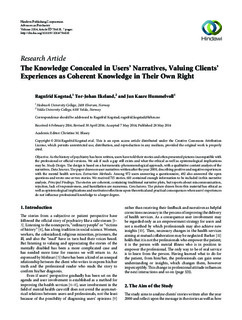The Knowledge Concealed in Users’ Narratives, Valuing Clients’ Experiences as Coherent Knowledge in Their Own Right
Journal article, Peer reviewed
Permanent lenke
http://hdl.handle.net/11250/196374Utgivelsesdato
2014Metadata
Vis full innførselSamlinger
Originalversjon
Kogstad, R., Ekeland, T.-J. & Hummelvoll, J.K. (2014). The Knowledge Concealed in Users’ Narratives, Valuing Clients’ Experiences as Coherent Knowledge in Their Own Right. Advances in Psychiatry, 2014, Article ID 786138. 10.1155/2014/786138Sammendrag
Objective. As the history of psychiatry has been written, users have told their stories and often presented pictures incompatible with the professional or official versions. We ask if such a gap still exists and what the ethical as well as epistemological implications may be. Study Design.The design is based on a hermeneutic-phenomenological approach, with a qualitative content analysis of the narratives. Data Sources.The paper draws on user narratives written after the year 2000, describing positive and negative experiences with the mental health services. Extraction Methods. Among 972 users answering a questionnaire, 492 also answered the open questions and wrote one or two stories.We received 715 stories. 610 contained enough information to be included in this narrative analysis. Principal Findings.The stories are coherent, containing traditional narrative plots, but reports about miscommunication, rejection, lack of responsiveness, and humiliation are numerous. Conclusions.The picture drawn from this material has ethical as well as epistemological implications and motivates reflections upon theoretical and practical consequences when users’ experiences do not influence professional knowledge to a larger degree.
Beskrivelse
This is an open access article distributed under the Creative Commons Attribution License, which permits unrestricted use, distribution, and reproduction in any medium, provided the original work is properly cited. The article was originally published in Advances in Psychiatry and can be found here: http://www.hindawi.com/journals/apsy/
